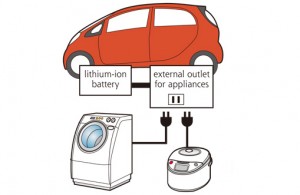 Mobile Kitchen
Mobile Kitchen
Drive, listen to the radio, microwave popcorn? Yes, you can do all three in the new Mitsubishi i-MiEV, the world’s first mass-produced electric vehicle. A feature of the car is that the battery allows you to power domestic electrical appliances. Believe it or not, the adaptor has enough kick to run a rice cooker or microwave for as long as a day and a half. WSJ
Eco Effort
The Infineon Raceway, a NASCAR racetrack in California, has received praise for its sustainable efforts, including a comprehensive recycling program, the use of reclaimed wastewater for landscaping, owls and sheep for pest-control/lawn maintenance, and the planting of 10 trees following each race to offset carbon emissions. Just last month, the raceway announced that it cut its sign’s energy in half by swapping out 7,000 traditional light bulbs for 57,600 LED lights. The issue? The eco-efforts may never truly cut down on the environment degradation caused by the endless loops the snazzy cars take. GOOD
Slick Slip
On Friday, July 1, while Americans were barbequing and lighting off fireworks to celebrate America’s Independence, news broke that ExxonMobil oil was spilling out across Montana’s Yellowstone River. On Wednesday, the company shared that it took nearly an hour to fully seal the burst pipeline instead of the 30 minutes that company president Gary Pruessing had initially announced. TIME
Locked Parks
On Friday, July 1 nearly all Minnesota state government functions were closed for business because Governor Mark Dayton and GOP legislators could not agree on a new two-year budget plan. State parks were also closed at night during the Fourth of July weekend. In response, numerous break-ins and vandalism were reported, and 11 individuals were taken into custody. REUTERS
Rhino Rescue
After 20+ years of nursing Rhino’s back to healthy population numbers, efforts have succeeded. In 2010 it was announced that Rhino’s were at stable and increasing populations, no longer in threat of endangerment. Unfortunately, conservation efforts are once again at risk because poaching is on the rise. The World Wildlife Foundation (WWF) published figures this week stating that a demand for rhino horns in Asia is causing an extreme increase in poaching. During the first six months of 2011, nearly 200 rhinos were killed in South Africa. NY TIMES






